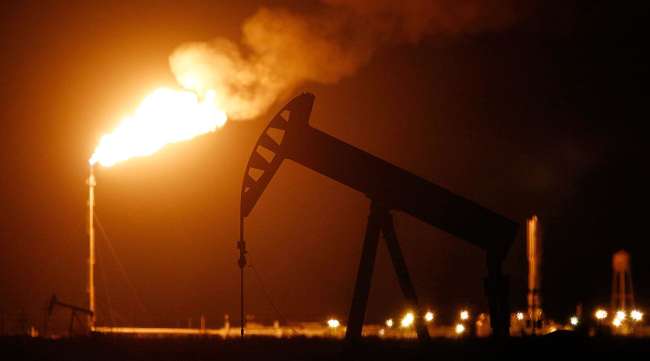EPA Seeks to Abandon Regulation of Methane Leaks From Oil Wells

[Stay on top of transportation news: Get TTNews in your inbox.]
The Trump administration is seeking to abandon regulations designed to stop methane leaks from oil and gas wells, a move opposed not just by environmentalists but even some energy companies that worry that it will undermine the appeal of natural gas as climate-friendly fuel.
The proposal, unveiled Aug. 29 by the Environmental Protection Agency, is the latest assault in President Donald Trump’s campaign to weaken Obama-era measures fighting climate change, building on previous efforts to ease greenhouse gas emission limits on power plants and automobiles.
Although methane is the chief component of natural gas and therefore a valuable energy source in its own right, it is also a powerful heat-trapping pollutant. And the methane that escapes from pipelines, compressor stations and from oil wells has been blamed for up to a quarter of the planet’s warming.
The Trump EPA was already moving on a separate track to relax requirements put in place by the Obama administration that forced energy companies to use specialized equipment at wells and search out methane leaks at the sites. The new measure would also short-circuit a legal requirement that similar curbs be imposed on a million existing wells, mandates that could disproportionately affect smaller, independent oil companies.
EPA Administrator Andrew Wheeler said in a news release the proposal “removes unnecessary and duplicative regulatory burdens from the oil and gas industry.”
Although independent oil producers backed the EPA’s move, it comes against the wishes of several global energy companies, such as BP Plc and Royal Dutch Shell Plc, which have warned the administration’s retreat on methane threatens to undermine the sales pitch for natural gas as a climate-friendly power source that burns cleaner than coal. Executives from both companies criticized the proposal Thursday.
Methane accounts for just 10% of U.S. greenhouse gas emissions, yet it packs a big punch. It has more than 84 times the heat-trapping potential of carbon dioxide the first two decades it escapes into the atmosphere and is at least 28 times more powerful over a century. The oil industry is the leading industrial source of it.
“There is overwhelming scientific evidence that methane is harmful — more harmful than we thought — and the oil and gas sector is a bigger contributor to that pollution than we thought,” said Peter Zalzal with the Environmental Defense Fund.
The Obama administration took direct aim at the oil industry’s methane emissions in 2016, by imposing requirements for energy companies to frequently seek and plug leaks at wells drilled after the regulation was put in place. Other requirements also managed to pare methane emissions but did so indirectly, by targeting other, conventional pollutants and seeking to stop the waste of natural gas extracted from federal lands.
Though the 2016 requirements were targeted to new wells, they triggered a legal requirement that the EPA also regulate methane from oilfield infrastructure put in place prior to that year. The expense and challenge of plugging leaks on some decades-old, low-producing wells could force some companies to shut in production at the sites, according to the Independent Petroleum Association of America.
Under Thursday’s proposal, the EPA would effectively divide the oil and gas industry into two segments for the purposes of greenhouse gas regulation, with upstream wells classified separately from pipelines, tanks and natural gas transmission, which would effectively be exempted from methane mandates.
More than 40 oil and gas companies have made voluntary commitments to keep methane in check, even as some of them insist federal regulation is essential, too.
“We have to reduce methane emissions for natural gas to realize its full potential in our energy mix,” BP America Inc. Chairman Susan Dio said by email. “The more gas we keep in our pipes and equipment, the more we can provide to the market — and the faster we can all move toward a lower-carbon future.”
Environmental advocates have argued that voluntary industry steps are inadequate given the scale of the problem and within a highly fragmented industry. Oil companies with big balance sheets and wells concentrated in a few areas of the U.S. may be better able to absorb the costs of equipment retrofits, methane monitoring and leak-repair programs than smaller, independent producers with wide-ranging infrastructure.
“We believe sound environmental policies are foundational to the vital role natural gas can play in the energy transition and have made clear our support of 2016 law to regulate methane from new and modified onshore sources,” Gretchen Watkins, president of Shell Oil Co. said in an emailed statement. Shell urged the administration to impose methane requirements on existing wells, too, Watkins said, because the “EPA’s commitment to cost-effective regulations makes it uniquely qualified to write a workable rule.”
Supporters of the EPA’s measure say the Obama administration went too far in deciding to specifically regulate methane, rather than focusing on paring conventional pollution from oil and gas infrastructure.
Existing EPA requirements — which focus on paring the release of volatile organic compounds at oil and gas wells — would still help rein in methane emissions at the sites, just indirectly. And as new wells are drilled — and old wells stop producing — more of them fall under those regulations targeting volatile organic compounds. By 2023, nearly 90% of all U.S. natural gas and oil production will fall under the earlier EPA requirements, according to the American Petroleum Institute.
But environmental advocates said the EPA proposal will squander time in an urgent fight against climate change.
The EPA is “proposing to give an entire segment of the oil and gas sector a pass from controlling its air pollution,” said Darin Schroeder, an attorney with the Clean Air Task Force. “To justify these actions, EPA is ignoring decades of its own precedent and mountains of evidence that prove that not only is reducing methane from the entire industry easily done, but it is also extremely important if we are to avoid the most catastrophic impacts from climate change.”




